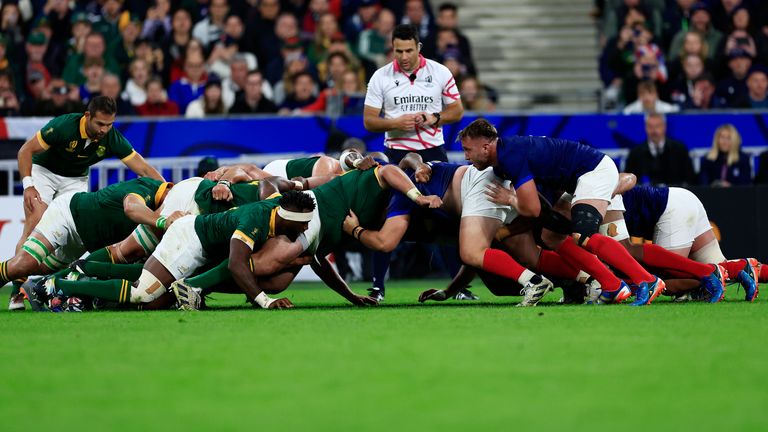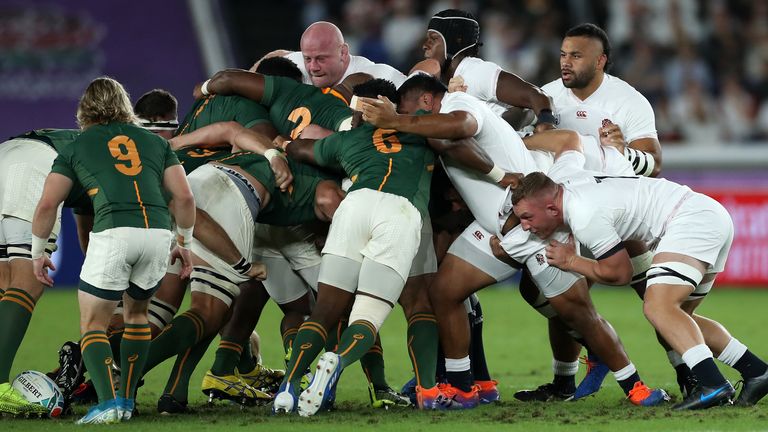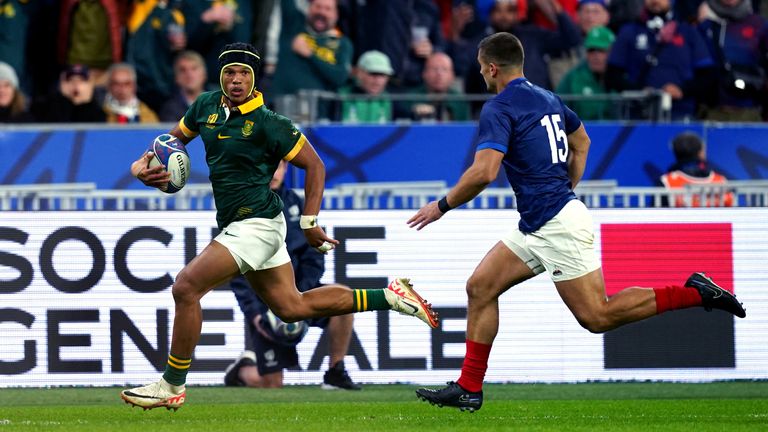Rugby World Cup: England's almighty challenge vs South Africa: What game plan could succeed?
England vs South Africa in Rugby World Cup semi-final at Stade de France on Saturday (8pm); Scrum parity an absolute necessity; Steward back crucial with high ball in mind; The tight exchanges: England need best breakdown, maul displays in years; Could semi-final go down to place-kicking?

Sunday 22 October 2023 07:02, UK
Ahead of England's Rugby World Cup semi-final against South Africa on Saturday, we look at England's almighty challenge, and what areas they need to get right to have a chance...
Scrum parity an absolute necessity
If there is one area of rugby South Africa are unequivocally the strongest in the world, it is at the scrum.
The Springboks props in looseheads Steven Kitshoff and Ox Nche, and tightheads Frans Malherbe and Vincent Koch, have forced scrum penalties against the highest calibre of opposition.
A combination of their brute strength and physicality, enormous second rows Eben Etzebeth, Franco Mostert and RG Snyman pushing behind the props, and the tactical use of their bench - rather cringeworthily termed the 'Bomb Squad' - marks the Springbok scrum as one of the toughest things to deal with across an 80 minutes.
- Freddie Steward replaces Marcus Smith in one of three England changes for RWC semi
- SA to face England in World Cup semi-finals after knocking out France
- Owen Farrell breaks Fijian hearts to send England into World Cup semi-finals
- All Blacks break Ireland World Cup hearts again
Scotland, Ireland and France each came under scrum pressure against South Africa at this World Cup, and it's no coincidence that the side who fared best out of that trio, Ireland, went on to win their clash.
Trending
- Man Utd vs Newcastle LIVE! Rashford on the bench - predict the score...
- Ipswich vs Chelsea LIVE!
- World Darts Championship LIVE! Littler, MVG & Bunting headline at Ally Pally
- Aston Villa vs Brighton LIVE!
- Transfer Centre LIVE! Wolves make Danso top centre-back target in January
- World Darts Championship schedule: Littler faces Joyce on Monday night
- Man Utd latest: 'Club struggling to tie Garnacho and Mainoo down to new deals'
- Rashford recalled after four-game Man Utd absence
- Tottenham latest: 'No chance' Spurs should change manager
- Football latest: Carabao Cup to trial in-stadium VAR announcements
One has only to look back four years to the 2019 Rugby World Cup final in Japan between England and South Africa to be reminded of what impact and damage a scrum clearly in the ascendency can do.
England that day - a far, far stronger, more talented and in-form side than the current group - lost Kyle Sinckler to a head injury just two minutes in, meaning Dan Cole had to come on to play virtually the entire game.
The first scrum of the final occurred in the immediate aftermath of Cole's arrival, and the Boks went to town as a secondary shove gained power and forced referee Jerome Garces to raise his arm. It would be far from the last time.
Further scrum penalties arrived after 17, 26 and 40 minutes - the latter two allowing Handre Pollard to kick the Boks into a six-point half-time lead.
On 44 minutes, props Kitshoff and Koch arrived and fashioned the most dominant scrum effort of the Test, annihilating their English counterparts. Pollard kicked three more points to extend the lead to nine, and in an arm-wrestle type contest, such a margin was always likely to prove significant.
Four minutes later, another scrum penalty saw the Boks exit their 22. Psychologically, it was immensely taxing on the English pack, and there was no way back. Of the 10 penalties they conceded that day, six came via the scrum.
England - who have Cole starting on Saturday - need to lock out the set-piece and achieve parity at Stade de France, or else they have virtually no chance to succeed.
Steward back at full-back crucial with high ball in mind
In Sunday's thrilling World Cup quarter-final between hosts France and South Africa, Les Bleus had more possession (60 per cent), more territory (63 per cent) and more attacking minutes (20.8 vs SA's 14.1). By most metrics, France should have won the Test.
Yet, their incredible start to the contest failed to be rewarded with a healthy lead, and the main factor for that was two South Africa high balls which weren't dealt with by France in their own half, resulting in two Springbok tries out of nothing.
Instead of heading into a deserved 14-0 lead, France were looking at a scoreline of 12-7 down, as first centre Gael Fickou failed to deal with a high-hanging Cobus Reinach box-kick, letting it bounce off him and back towards his own tryline for wing Kurt-Lee Arendse to scoop up and run in untouched, before lock Cameron Woki bobbled and spilled an uninventive Manie Libbok bomb for Damian de Allende to run on and score.
France did recover to take a six-point lead in the Test during the second half, of course, but presenting South Africa 12 soft early points was a hammer blow and critical to their ultimate one-point loss.
- Richard Wigglesworth 'does not understand' Owen Farrell boos as fans ejected for fighting
- Steve Borthwick: I'm sure we'll be written off again
That brings us to England. In their quarter-final win over Fiji, Marcus Smith started at full-back in place of the safe pair of hands that is Freddie Steward, having previously started against minnows Chile. Smith has never started at full-back for his club Harlequins, always playing at fly-half.
Smith, who under Eddie Jones appeared to have made the England fly-half jersey his own, has slipped behind George Ford and Owen Farrell in the pecking order for No 10 under Borthwick, but his running threat in broken field is undoubted.
As such, Borthwick and co selected him at full-back against Chile, where he ran amok and gave an example of his superb talent with ball in hand.
The major caveat to that, of course, is that firstly, Chile were one of the weakest sides at the World Cup, and secondly, a crucial aspect to full-back play at the top of Test rugby is ability in the air under a high ball, and Smith was not tested in this area.
Chile did not manage to, neither did Samoa once Smith emerged off the bench to play at full-back, and nor did Fiji due to the fact kicking is not a major part of Pacific Island rugby.
Smith has been ruled out due to concussion, but South Africa will kick at England's full-back, and they will do it relentlessly. As such, the smart move would have been to reintroduce Steward anyway in order to diffuse the Springboks' aerial threat and stop the potential for conceding soft tries.
The tight exchanges: England need their best breakdown, maul displays in years
In addition to needing scrum parity, and a near-impeccable performance under the high ball, the two other areas England need to step up in are the breakdown and lineout maul.
In many ways the breakdown proved a huge area in deciding South Africa's victory over France. And South Africa came out on top there for two reasons: The Springboks do possess superb breakdown operators, and they adapt to the referee like nobody else.
Kiwi ref Ben O'Keeffe, who has refereed South Africa twice already this World Cup - against Ireland and France - takes charge of them a third time this Saturday, and he set out his stall early in the quarter-final that he didn't want to give loads of penalties. As such, South Africa got away with all sorts there, regularly competing or slowing down ball off feet and entering rucks from all angles.
If O'Keeffe takes the same position this Saturday, England need to adapt quicker than France did and fight fire with fire. Dominating the breakdown almost always leads to winning a Test match.
If the scrum is South Africa's No 1, then not far beyond is the maul.
Springbok rugby does and has always revolved heavily around set-piece exchanges in the tight. They have a superb lineout defence - one which wrecked Ireland despite the Irish winning - and their rolling maul is a central avenue of tries.
Maul defence is something England will have to really concentrate on this week. If they are weak or not fully connected in that area, South Africa will rip through for plenty of points.
Could the semi-final come down to place-kicking...?
If England do manage to play above themselves, defend incredibly and keep the game close throughout - which would take an almighty effort - one area Borthwick's side do have a distinct advantage in is place-kicking.
Starting South Africa fly-half Manie Libbok has kicked dreadfully in the World Cup to date, and the man who has often taken over the duties in Faf de Klerk is sat on the bench.
Owen Farrell, by contrast, produced his best kicking display to date against Fiji, albeit he has struggled hugely off the tee of recent times too.
In a kicking contest between Libbok and Farrell, England's skipper would definitely be the more reliable. Pollard's emergence off the bench for SA - who came on after just 45 minutes versus France - would potentially tip place-kicking back into the Springboks' favour, however.











